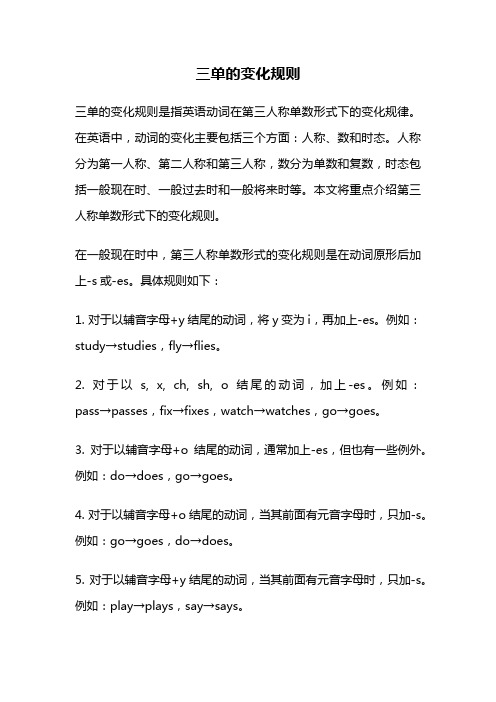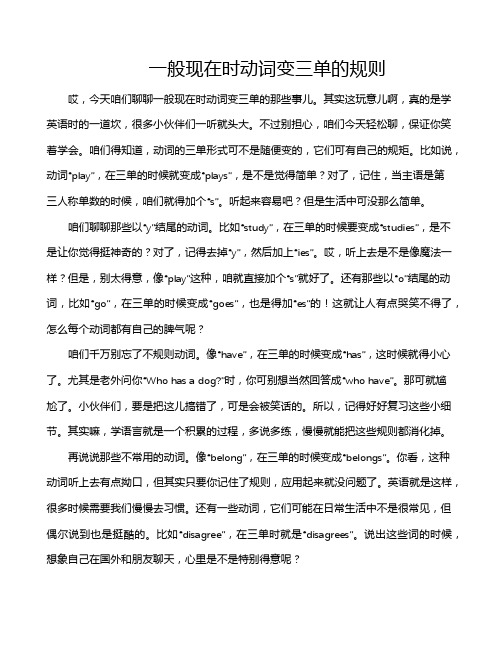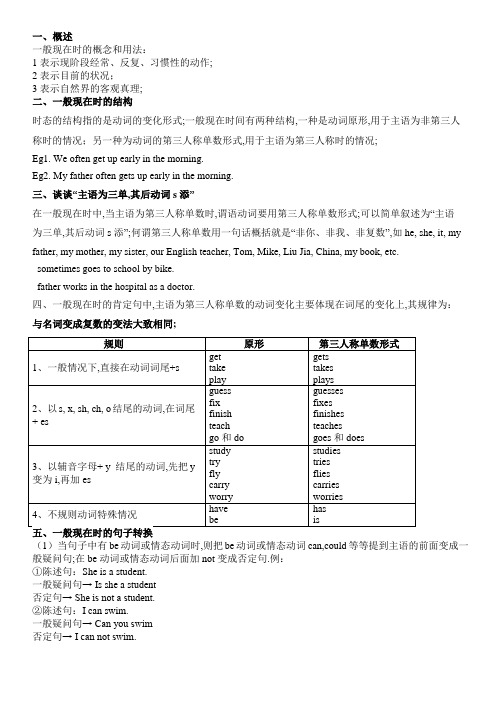一般现在时中动词的第三人称单数变化规则
动词第三人称单数变化规则

动词第三人称单数变化规则1、一般现在时主语第三人称时的动词变化”-s”①在一般现在时中,当主语为第三人称单数时,动词要用“-s”型(即第三人称单数形式)。
②所谓动词“s”型的构成,可按名词变复数的规则来记,即:•(1)大多数动词直接加__S_ 如:Play-plays,swim-swims.•(2)以_s,x,_ch,_sh,_o_结尾的动词,后面加_es__ 如:watch-watches,wash-washes.go-goes.teach-teaches •(3)以辅音字母加y结尾的变_y__ 为_i__加_es__ 如:study-studies, fly-flies•(4)特殊变化:have - has一.写出下列动词的第三人称单数形式。
read ______go ______stay _____ make _______ brush_______look______have_____ carry___ come______teach_______watch______play_______ fly______study______二、根据所给单词的适当形式填空• 1 He ___ the piano very well. (play)• 2 She ___ got a stamp from Canada .(have)• 3 I ___ housework at home (do)• 4 Eric ___ to school at 6:00 o’clock. (go)• 5 He clothes at home. (wash)• 6 My teacher often ___ TV in the evening. (watch)•7 Daming ___ English well every day.(study)•8 The boys ___ swimming (like)•9 She ____ from America.(come)•10 He ____ like his mother.(look)。
第三人称单数的用法规则

第三人称单数的用法规则第三人称单数是英语中表示一个人、事物或概念的语法形式。
在英语中,第三人称单数包括单数主语的动词、代词、形容词和冠词等。
正确使用第三人称单数是英语语法的关键之一,以下是第三人称单数使用的规则和注意事项。
1.动词的一般现在时:在第三人称单数时,动词的一般现在时使用动词原形加上-s或-es结尾。
例如:- He plays football on Sundays.(他在星期天踢足球。
)- She runs in the park every morning.(她每天早上在公园里跑步。
)2.动词的一般过去时:例如:- He went to school yesterday.(他昨天去了学校。
)- She cooked dinner for her family.(她为家人做了晚饭。
)3.动词的进行时:在第三人称单数时,动词的进行时和一般现在时一样,使用动词原形加上-s或-es结尾。
例如:- He is playing basketball now.(他正在打篮球。
)- She is studying for her exam.(她正在准备考试。
)4.代词:例如:- He is my brother.(他是我的兄弟。
)- She is my sister.(她是我的姐妹。
)- It is a cat.(它是一只猫。
)5.动词的情态动词和助动词:在第三人称单数时,情态动词和助动词不需要变化。
例如:- He can swim very well.(他游泳游得很好。
)- She has been to England.(她去过英国。
)6.冠词和形容词:在第三人称单数时,不需变化。
例如:- He is a clever boy.(他是个聪明的男孩。
)- She is an honest person.(她是个诚实的人。
)7.注意事项:(1)注意动词的不规则变化,例如go(第三人称单数形式为goes),do(第三人称单数形式为does),have(第三人称单数形式为has)等。
三单的变化规则

三单的变化规则三单的变化规则是指英语动词在第三人称单数形式下的变化规律。
在英语中,动词的变化主要包括三个方面:人称、数和时态。
人称分为第一人称、第二人称和第三人称,数分为单数和复数,时态包括一般现在时、一般过去时和一般将来时等。
本文将重点介绍第三人称单数形式下的变化规则。
在一般现在时中,第三人称单数形式的变化规则是在动词原形后加上-s或-es。
具体规则如下:1. 对于以辅音字母+y结尾的动词,将y变为i,再加上-es。
例如:study→studies,fly→flies。
2. 对于以s, x, ch, sh, o结尾的动词,加上-es。
例如:pass→passes,fix→fixes,watch→watches,go→goes。
3. 对于以辅音字母+o结尾的动词,通常加上-es,但也有一些例外。
例如:do→does,go→goes。
4. 对于以辅音字母+o结尾的动词,当其前面有元音字母时,只加-s。
例如:go→goes,do→does。
5. 对于以辅音字母+y结尾的动词,当其前面有元音字母时,只加-s。
例如:play→plays,say→says。
6. 对于以辅音字母+ch, sh, x结尾的动词,当其前面有元音字母时,只加-s。
例如:teach→teaches,wash→washes。
在一般过去时中,第三人称单数形式的变化规则是在动词原形后加上-ed或-d。
具体规则如下:1. 对于以辅音字母+e结尾的动词,直接加上-d。
例如:live→lived,hope→hoped。
2. 对于以重读闭音节结尾的动词,双写最后一个辅音字母,再加上-ed。
例如:stop→stopped,plan→planned。
3. 对于以辅音字母+y结尾的动词,将y变为i,再加上-ed。
例如:study→studied,carry→carried。
4. 对于以辅音字母结尾的动词,当其前面是元音字母时,双写最后一个辅音字母,再加上-ed。
一般现在时动词变三单的规则

一般现在时动词变三单的规则哎,今天咱们聊聊一般现在时动词变三单的那些事儿。
其实这玩意儿啊,真的是学英语时的一道坎,很多小伙伴们一听就头大。
不过别担心,咱们今天轻松聊,保证你笑着学会。
咱们得知道,动词的三单形式可不是随便变的,它们可有自己的规矩。
比如说,动词“play”,在三单的时候就变成“plays”,是不是觉得简单?对了,记住,当主语是第三人称单数的时候,咱们就得加个“s”。
听起来容易吧?但是生活中可没那么简单。
咱们聊聊那些以“y”结尾的动词。
比如“study”,在三单的时候要变成“studies”,是不是让你觉得挺神奇的?对了,记得去掉“y”,然后加上“ies”。
哎,听上去是不是像魔法一样?但是,别太得意,像“play”这种,咱就直接加个“s”就好了。
还有那些以“o”结尾的动词,比如“go”,在三单的时候变成“goes”,也是得加“es”的!这就让人有点哭笑不得了,怎么每个动词都有自己的脾气呢?咱们千万别忘了不规则动词。
像“have”,在三单的时候变成“has”,这时候就得小心了。
尤其是老外问你“Who has a dog?”时,你可别想当然回答成“who have”。
那可就尴尬了。
小伙伴们,要是把这儿搞错了,可是会被笑话的。
所以,记得好好复习这些小细节。
其实嘛,学语言就是一个积累的过程,多说多练,慢慢就能把这些规则都消化掉。
再说说那些不常用的动词。
像“belong”,在三单的时候变成“belongs”。
你看,这种动词听上去有点拗口,但其实只要你记住了规则,应用起来就没问题了。
英语就是这样,很多时候需要我们慢慢去习惯。
还有一些动词,它们可能在日常生活中不是很常见,但偶尔说到也是挺酷的。
比如“disagree”,在三单时就是“disagrees”。
说出这些词的时候,想象自己在国外和朋友聊天,心里是不是特别得意呢?讲到这里,咱们不能忘了动词的发音。
有些动词在变三单的时候,发音也会有些变化。
比如“catch”,在三单的时候是“catches”,这个时候的“e”就要轻轻地发出来。
单数第三人称动词用法及变化规则

单数第三人称动词用法及变化规则在一般现在时中,当主语是第三人称单数时,谓语动词要用第三人称单数形式,即常在动词原形后加-s或-es。
现归纳总结如下: 一、人称代词he, she, it 是第三人称单数。
如:He likes watching TV. 他喜欢看电视。
She has lunch at twelve. 她十二点吃午餐。
It looks like a cat. 它看起来像只猫。
二、单个人名、地名或称呼作主语;是第三人称单数。
如:①Tom looks like her mother. 韩梅看起来像她的母亲。
②Beijing is in China. 北京在中国。
③ Uncle Wang often makes cakes. 王叔叔经常做蛋糕。
三、单数可数名词或"this / that / the+单数可数名词"作主语时,是第三人称单数。
如:① A horse is a useful animal. 马是有用的动物。
② This book is yours. 这本书是你的。
③ That car is red. 那辆小汽车是红色的④ The cat is Lucy's. 这只猫是露茜的四、不定代词some one, somebody, n obody, everythi ng, someth ing 等及指示代词this, that 作主语时,是第三人称单数。
如:① Everyone is here. 大家到齐了。
② There is something wrong with the watch. 这块手表有毛病。
③ This is a pen. 这是一支钢笔④ That is an eraser. 那是一块橡皮擦五、不可数名词作主语时为第三人称单数。
如:①T he milk is in the glass.牛奶在玻璃杯里。
② The bread is very small. 那面包很小。
动词第三人称单数形式构成规则

般现在时动词第三人称单数形式构成规则(一般现在时中主语时第三人称1大多数动词在词尾加“S”如:①stop —stops make —makes read —reads play —plays [z]2、以辅音字母加“ y”结尾的,要先将“ y”变为“ i ”,然后在加“ es”读[iz]女口:fly —flies carry —carries study —studies worry —worries3、以“ s, x, ch, sh ”结尾的,在词尾加“ es”,发音为如:teach —teaches watch —watches4、以“ o”结尾的动词,加“ es”,如:go —goes do —does5、以不发音字母“ e”结尾的开音节词,加“s ”女口:close —closes [iz]6、be 动词包括:am,is ,are 。
第三人称单数用is ;过去式为was ;复数用are ,过去式为were.1. 动词have ,遇到主语是第三人称单数时,要用has ;动词be 的第三人称单数形式是is 。
2. 含有动词第三人称单数形式的句子变否定句时,要用doesn't + 动词原形,如:He goes to school at six in the morning.(变否定句)He does n't go to schoolat six in the morning.3. 对含有动词第三人称单数形式的句子提问时,要用助动词does,如:She goes home at five every day.(对划线部分提问)When / What time does shego home every day?般现在时中的第三人称单数形式在一般现在时中,当主语是第三人称单数时,谓语动词要用第三人称单数形式,原形后加即常在动词-s 或-es 。
I 什么是一般现在时?一般现在时的基本用法有哪些呢?No. 1 】一般现在时的功能1. 表示事物或人物的特征、状态。
一般现在时的动词形式变化

一般现在时的动词形式变化
1.第三人称单数形式:
在第三人称单数(he、she、it以及姓名单数形式)时,一般现在时
的动词要加上-s或-es。
例如:I walk(我走),He walks(他走);They play(他们玩),She plays(她玩)。
2.肯定句的一般现在时:
在肯定句中,一般现在时的动词使用原形。
例如:I play soccer(我踢足球),They eat dinner(他们吃晚饭)。
3.否定句的一般现在时:
在否定句中,一般现在时的动词要加上do not(don't)或does not (doesn't),与动词原形连用。
例如:I do not play soccer(我不踢足球),They do not eat dinner(他们不吃晚饭)。
4.疑问句的一般现在时:
在疑问句中,一般现在时的动词要使用do或does作为助动词,并将
其与主语调换位置。
例如:Do you play soccer?(你踢足球吗?),Does she eat dinner?(她吃晚饭吗?)。
5.一般现在时的特殊动词:
一些特殊动词在一般现在时中有不规则变化。
例如:I am(我是),He has(他有)。
需要注意的是,一般现在时的动词变化规则并不适用于所有情况,有一些动词在一般现在时下有自己的特殊形式。
一般现在时动词第三人称单数变化规则

一、概述一般现在时的概念和用法:1表示现阶段经常、反复、习惯性的动作;2表示目前的状况;3表示自然界的客观真理;二、一般现在时的结构时态的结构指的是动词的变化形式;一般现在时间有两种结构,一种是动词原形,用于主语为非第三人称时的情况;另一种为动词的第三人称单数形式,用于主语为第三人称时的情况;Eg1. We often get up early in the morning.Eg2. My father often gets up early in the morning.三、谈谈“主语为三单,其后动词s添”在一般现在时中,当主语为第三人称单数时,谓语动词要用第三人称单数形式;可以简单叙述为“主语为三单,其后动词s添”;何谓第三人称单数用一句话概括就是“非你、非我、非复数”,如he, she, it, my father, my mother, my sister, our English teacher, Tom, Mike, Liu Jia, China, my book, etc.sometimes goes to school by bike.father works in the hospital as a doctor.四、一般现在时的肯定句中,主语为第三人称单数的动词变化主要体现在词尾的变化上,其规律为:与名词变成复数的变法大致相同;(2)当句子中即没有be动词,也没有情态动词时,则在主语前加助动词do you,以及复数, does单数she,he,it变成一般疑问句;在主语后谓语动词前加助动词don’tI,you,以及复数, doesn’t单数she,he,it变成否定句,助动词后的动词要变成动词原形;例:①陈述句:We get up at 7:00 every morning.一般疑问句→Do you get up at 7:00 every morning否定句→We don’t get up at 7:00 every morning.②陈述句:She has a little brother.一般疑问句→ Does she have a little brother否定句→ She doesn’t have a little brother.哪些主语是第三人称单数1、人称代词he, she, it;如:He likes watching TV. 他喜欢看电视;She has lunch at twelve. 她十二点吃午餐;It looks like a cat. 它看起来像只猫;2、单个人名、地名或称呼作主语;是第三人称单数;如:Han Mei looks like her mother. 韩梅看起来像她的母亲;Beijing is in China. 北京在中国;Uncle Wang often makes cakes. 王叔叔经常做蛋糕;3、单数可数名词或this / that / the + 单数可数名词作主语时,是第三人称单数;A horse is a useful animal. 马是有用的动物;This book is yours. 这本书是你的;That car is red. 那辆小汽车是红色的;The cat is Lucy's. 只猫是露茜的;4、不可数名词作主语时为第三人称单数;如:The milk is in the glass.牛奶在玻璃杯里;The bread is very small. 那面包很小;The water is very cold. 那些水很凉;1、写出下列动词的第三人称单数;drink ________ go _______ stay ________ make ________ look _________have_______ pass_______ carry _______ come________ watch________plant_______ fly ________ study_______ brush________ teach________catch_________ wash___________do________ like________ say_______learn ___________eat___________ read___________ sing___________ buy__________study_______ come__________plant种植______2、用括号内动词的适当形式填空;1. He often ________have dinner at home.2. We _____________ not watch TV on Monday.3. Nick ___________ not go to the zoo on Sunday.4. ________ they __________ like the World Cup5. What _________they often _________ do on Saturdays6. _________ your parents _________ read newspapers every day7. There ________be some water in the bottle.8. My aunt _______look after her baby carefully.9. The child often _______watch TV in the evening.10. Mike’s sister ________ cook nice food. I _______ like eating it very much.11. _______ do your brother_______ watch TV in the evening No, he_______ not.12. We often___________play in the playground.13. He _________get up at six o’clock.brush your teeth every morning.15. What________ do he usually______ do after school studyEnglish,Chinese,Maths,Science and Art at school.17. Mike sometimes __________go to the park with his sister.18. At eight at night, she often__________watch TV with his parents.19. ________ Mike________read English every daymany lessons_________your classmate________have on Monday 21. What time_________his mother_________do the housework_____________ go to school on foot every day .______________ not have any lessons on Sundays ._____________ brush her teeth twice a day .students ____________ be not good at boating .Hua always ____________ carry water for his grandpa on Sundays . ____________ like making friendslazy boy ______________ not do his homework in the evening . many classes _________you __________ have every day__________the baby ___________ look likecan ___________ teach us Enlgish well .11. He often ________have dinner at home.12. Daniel and Tommy _______be in Class One.13. Nick _________not go to the zoo on Sunday.14. What _______they often _______do on Saturdays15. _______ your parents _______read newspapers every day16. The girl ____________teach us English on Sundays.17. She and I ________take a walk together every evening.18. There ________be some water in the bottle.19. They _______have the same hobby.20. My aunt __________look after her baby carefully.21. You always _______do your homework well.22. I _______be ill. I’m staying in bed.23. She _______go to school from Monday to Friday.24. The child often ____________watch TV in the evening.day _______be it today -It’s Saturday.26. He _________ get up at six o'clock.1. I ________to school at 7:00 in the morning.A. goB. goingC. goes2. They _______books every day in the library.B. readC. reading3. The monkey________ eating bananas very much.B. likesC. liking4. My father ________to read newspaper after supper every day.B. likesC. liking5. I like watching TV, but my mother _________like it.A. don’tB. doesn’tC. does6. ____________ your father drink milk every dayB. areC. does7. We will go shopping if it____ tomorrow.'t rain B. didn't rain 't rain D. isn't rain8. He said the sun ____in the east and ____in the west.A rose; setB rises; setsC rises, setD rise; setsMei ____ music and often ____ to music.A like; listenB likes; listensC like; are listeningD liking ; listen10. Jenny____ English every evening.A has studyB studiesC studyD studied3、选出正确的答案:1. She like / likes to play football.2. He like / likes drinking milk.3. I like / likes to watch TV.4. We like / likes to play badminton.5. They like / likes to sing songs.6. She read / reads books every day.7. He play / plays computer games every day.8. It listen / listens to the radio every day.9. Linda draw / draws pictures every day.10. Jane and Linda play / plays football every day.5、把下列句子变为否定句:1. We like playing football.2. Linda swims every day.3. They like playing games.4. My father reads newspaper in the evening.7、把下列句子变为疑问句,并做肯定和否定回答;1. My brother can ride a horse.2. We clean the classroom after school.___________________________________________________________。
